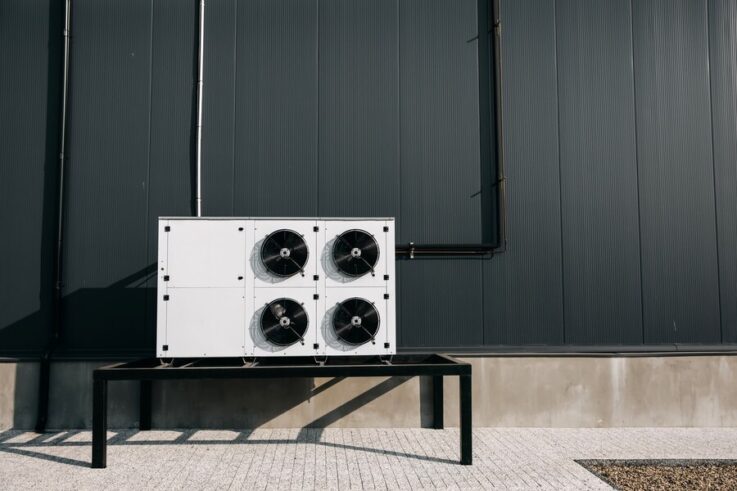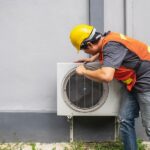
Choosing the Right HVAC System for Your Home
Choosing the Right HVAC System for Your Home
HVAC systems play a pivotal role in maintaining comfort and air quality within our homes. But with a plethora of options available, selecting the right one can be a daunting task. From central air conditioning to ductless mini-split systems, each comes with its own set of advantages and considerations. In this blog post, we’ll explore the key factors to consider when choosing the perfect HVAC system for your home, ensuring optimal comfort and efficiency year-round.
Importance of Choosing the Right System
Selecting the appropriate HVAC system is crucial for several reasons. Firstly, it directly impacts comfort levels within the home, ensuring occupants are neither too hot nor too cold. Moreover, choosing the right system can significantly affect energy efficiency and utility costs. An improperly sized or outdated system may lead to unnecessary expenses and energy wastage.
Additionally, selecting the right HVAC system tailored to your specific needs can enhance indoor air quality, contributing to better health and well-being for you and your family. Therefore, investing time and effort into choosing the right system is essential for long-term comfort, cost savings, and overall satisfaction.
Types of HVAC Systems
Central Air Conditioning
Central air conditioning systems use ducts to distribute cooled air throughout a home, consisting of an outdoor unit with a compressor and condenser coil and an indoor unit with an evaporator coil and air handler. They maintain consistent temperatures but require costly ductwork installation and may be less energy-efficient if poorly insulated or leaky.
Ductless Mini-Split Systems
Ductless mini-split systems offer individualized heating and cooling to specific zones or rooms within a home, utilizing an outdoor compressor/condenser unit connected to indoor air-handling units. These systems offer flexibility in zoning and energy efficiency, but may be more expensive to install upfront compared to central AC systems.
Heat Pumps
Heat pumps are energy-efficient systems that transfer heat between indoor and outdoor environments, providing heating and cooling during summer and absorbing it in winter. They offer significant savings on heating and cooling costs compared to traditional HVAC systems. However, their effectiveness may be limited in extreme climates with low temperatures.
Furnace and Air Conditioner Split Systems
Furnace and air conditioner split systems are common HVAC systems in homes, consisting of an outdoor air conditioner and an indoor furnace. They offer year-round comfort and are affordable. However, they require regular maintenance for optimal performance and can affect efficiency and indoor air quality due to ductwork issues.
Geothermal Heat Pumps
Geothermal heat pumps use the earth’s subsurface temperature to provide heating, cooling, and hot water for homes. They circulate heat transfer fluid through underground pipes, absorbing and releasing heat in winter and summer. These efficient and environmentally friendly systems require significant upfront investment and may not be feasible for all properties.
Central Air Conditioning: Pros and Cons
Central air conditioning systems offer several benefits, but they also come with their drawbacks:
Pros
- Whole-House Cooling: Central AC systems can efficiently cool the entire home, providing consistent comfort throughout every room.
- Improved Air Quality: Many central AC systems include air filters that help remove dust, pollen, and other airborne particles, improving indoor air quality.
- Quiet Operation: Modern central AC units are designed to operate quietly, ensuring minimal disruption to household activities and sleep.
- Increased Home Value: Installing a central AC system can enhance the resale value of a home, as it’s a desirable feature for many buyers.
Cons
- Costly Installation: Central AC systems require ductwork installation, which can be expensive, especially in homes without existing ducts.
- Energy Inefficiency: Ductwork can lead to energy losses through leaks or poor insulation, reducing the overall efficiency of the system.
- Inflexibility: Central AC systems may struggle to provide customized temperature control for individual rooms or zones, leading to potential discomfort in certain areas of the home.
- Maintenance Requirements: Central AC systems require regular maintenance, including filter replacement and duct cleaning, to ensure optimal performance and longevity.
Ductless Mini-Split Systems Explained
Ductless mini-split systems offer a versatile solution for heating and cooling individual rooms or zones within a home. These systems consist of an outdoor compressor unit connected to one or more indoor air-handling units, eliminating the need for ductwork. Each indoor unit can be independently controlled, allowing users to customize temperatures based on their preferences.
Ductless mini-splits are energy-efficient since they don’t suffer from duct losses, and they are ideal for homes where installing ductwork is impractical or cost-prohibitive. Additionally, they offer quiet operation and easy installation, making them a popular choice for retrofitting older homes or room additions.
Heat Pump Options for Efficient Heating and Cooling
Heat pumps provide efficient heating and cooling by transferring heat between the indoor and outdoor environments. These systems are available in various configurations, including air-source heat pumps and ground-source (geothermal) heat pumps. Air-source heat pumps extract heat from the outdoor air during the winter to warm the interior space and remove heat from indoors during the summer for cooling.
Ground-source heat pumps utilize the stable temperature of the earth for heating and cooling. Heat pumps are known for their energy efficiency, offering significant savings on utility bills compared to traditional heating and cooling systems. Additionally, they provide year-round comfort and environmental benefits, making them a sustainable choice for homeowners.
Considerations for Climate and Region
When selecting an HVAC system, it’s crucial to consider the climate and region where you live. Different climates require different heating and cooling solutions to ensure optimal comfort and efficiency. For example, homes in hot and humid climates may benefit from systems with enhanced dehumidification capabilities, while those in colder regions might prioritize heating efficiency.
Additionally, factors like altitude, proximity to bodies of water, and local building codes can also influence HVAC choices. By understanding the unique challenges posed by your climate and region, you can make informed decisions to select the most suitable HVAC system for your home.
Sizing Matters: Calculating Your HVAC Needs
Proper sizing is essential when selecting an HVAC system to ensure efficient operation and optimal comfort levels. Oversized units can lead to short cycling, where the system turns on and off frequently, resulting in energy waste and uneven heating or cooling. Undersized units, on the other hand, may struggle to meet the demands of the space, leading to inadequate temperature control and increased energy consumption.
To determine the correct size for your HVAC system, it’s essential to consider factors such as the size and layout of your home, insulation levels, window quality, and local climate conditions. Consulting with a qualified HVAC professional can help you accurately calculate your heating and cooling needs and select the right-sized system for optimal performance.
Energy Efficiency Ratings and Savings
Understanding energy efficiency ratings is crucial when choosing an HVAC system, as it directly impacts both environmental sustainability and cost savings. HVAC systems are rated based on their energy efficiency, typically using metrics like SEER (Seasonal Energy Efficiency Ratio) for cooling and AFUE (Annual Fuel Utilization Efficiency) for heating.
Higher SEER and AFUE ratings indicate greater efficiency, meaning the system consumes less energy to provide the same level of heating or cooling. Investing in a high-efficiency HVAC system may involve a higher upfront cost but can result in significant long-term savings on utility bills. Additionally, energy-efficient systems reduce greenhouse gas emissions and contribute to a more sustainable environment.
Maintenance Requirements for Different Systems
Regular maintenance is crucial for HVAC systems to function efficiently and extend their lifespan. The specific maintenance requirements vary depending on the system type. For central air conditioning systems, it includes changing filters, cleaning condenser coils, and inspecting ductwork. Ductless mini-split systems require cleaning indoor units and ensuring proper refrigerant levels.
Heat pumps may require additional checks, while geothermal heat pumps have fewer maintenance needs. Scheduling annual professional maintenance can prevent costly breakdowns, improve energy efficiency, and ensure consistent comfort throughout the year.
Budgeting for Installation and Operation Costs
When considering installing a new HVAC system, it’s crucial to budget not only for the upfront installation costs but also for ongoing operational expenses. Upfront costs include the price of the equipment, installation fees, and any necessary ductwork or electrical upgrades. However, it’s equally important to factor in long-term operational costs, such as energy bills, maintenance, and potential repairs.
Investing in a high-efficiency HVAC system may have a higher initial cost but can result in lower monthly utility bills and overall savings over time. By budgeting carefully and considering both upfront and ongoing expenses, homeowners can make informed decisions that align with their financial goals.
Seeking Professional Advice: Consulting HVAC Experts
Navigating the complexities of HVAC systems can be challenging for homeowners, which is why seeking professional advice from HVAC experts is highly recommended. HVAC professionals have the knowledge and experience to assess your home’s specific needs, recommend appropriate system options, and ensure proper installation and maintenance.
Consulting with HVAC experts can help homeowners avoid common pitfalls, such as choosing the wrong-sized system or overlooking essential maintenance tasks. Additionally, HVAC professionals can provide valuable insights into energy-saving strategies, rebate programs, and financing options that can help homeowners make informed decisions and maximize their investment in home comfort and efficiency.
Selecting the right HVAC system for your home is a decision that requires careful consideration of various factors, including your climate, budget, and environmental impact. By understanding the different types of systems available, considering energy efficiency ratings, and seeking professional advice, you can ensure optimal comfort, efficiency, and sustainability for your household.
At Cool Factory, Inc., we’re committed to helping homeowners in Sterling, VA, and the surrounding areas make informed choices about their HVAC needs. Contact us today at (703) 713-5113 to speak with our experts and discover the perfect HVAC solution for your home. Let’s create a comfortable and energy-efficient environment together!






